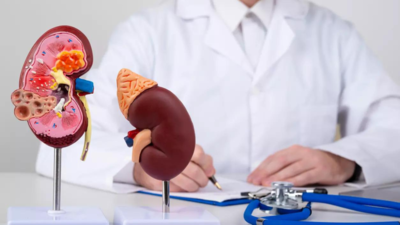
[ad_1]

NEW DELHI: Researchers, who reviewed 18 studies on benefits of drinking water, found the most evidence related to preventing kidney stones and helping people lose weight. Drinking eight cups of water a day significantly lowered one’s chances of getting another kidney stone, the researchers at the University of California San Francisco found.
They added that evidence from several studies suggested drinking about six cups of water a day helped adults lose weight.
However, a study involving teenagers found that drinking a little more than eight cups of water a day had no effect.
Further, studies raised the possibility of benefits for patients with migraine, urinary tract infection, diabetes and hypotension (low blood pressure) despite the limited quality and quantity of scientific evidence on the benefits of water, the authors said in the study published in the Journal of the American Medical Association (JAMA) Network Open.
“Given the low cost and low adverse-effect profile of water, further well-designed studies should assess benefits in these specific conditions,” the authors wrote.
“For such a ubiquitous and simple intervention, the evidence hasn’t been clear and the benefits were not well-established, so we wanted to take a closer look,” said senior author Benjamin Breyer, chair of the department of urology, University of California San Francisco.
“The amount of rigorous research turned out to be limited, but in some specific areas, there was a statistically significant benefit. To our knowledge, this is the first study assessing the benefits of water consumption on clinical outcomes broadly,” Breyer added.
The authors said encouraging people to drink water before meals would be a simple and cheap intervention that could have huge benefits given the increased prevalence of obesity.
Adults experiencing recurring headaches were found to feel better after three months of drinking more water, they added.
Drinking about four more cups of water a day for eight weeks was found to help diabetic patients whose blood glucose levels were elevated.
Further, women with recurrent urinary tract infections were found to benefit from drinking an additional six cups a day of water — the infections became less frequent with time.
Young adults with low blood pressure too benefitted from drinking water, the researchers said.
However, there is no one-size-fits-all approach when it comes to drinking water, Breyer said.
“We know that dehydration is detrimental, particularly in someone with a history of kidney stones or urinary infections,” he said.
“On the other hand, someone who suffers from frequent urination at times may benefit from drinking less. There isn’t a one size fits all approach for water consumption,” the senior author said.
[ad_2]
Source link